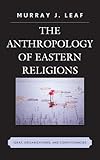The anthropology of eastern religions : ideas, organizations, and constituencies / Murray J. Leaf.
Material type: TextPublisher: Lanham, Maryland : Lexington Books, 2014Description: 1 online resource (xi, 177 pages)Content type:
TextPublisher: Lanham, Maryland : Lexington Books, 2014Description: 1 online resource (xi, 177 pages)Content type: - 9780739192412
- 0739192418
- Anthropology of religion -- Asia
- Religion and sociology -- Asia
- Asia -- Religion
- Anthropologie religieuse -- Asie
- Sociologie religieuse -- Asie
- Asie -- Religion
- POLITICAL SCIENCE -- Public Policy -- Cultural Policy
- SOCIAL SCIENCE -- Anthropology -- Cultural
- SOCIAL SCIENCE -- Popular Culture
- Anthropology of religion
- Religion
- Religion and sociology
- Asia
- 306.6095 23
- GN470.7
- online - EBSCO
| Item type | Current library | Call number | URL | Status | Notes | Barcode | |
|---|---|---|---|---|---|---|---|
 eBook
eBook
|
Biblioteca "Angelicum" Pont. Univ. S.Tommaso d'Aquino Nuvola online | online - EBSCO (Browse shelf(Opens below)) | Online access | Not for loan (Accesso limitato) | Accesso per gli utenti autorizzati / Access for authorized users | (ebsco)786122 |
Includes bibliographical references and index.
Print version record and CIP data provided by publisher; resource not viewed.
Machine generated contents note: 1. Introduction -- Related Approaches -- "Higher" Traditions in General -- The Theory -- Using the Theory -- Common Themes -- The Order of Description -- Further Reading -- Notes -- 2. Vedas and Vedanta -- Indus Valley Ideas -- South Asian Texts and Sects -- Translation Issues -- The Vedas -- The Upanishads -- Organizations, Personnel, and Constituency of Vedanta -- Conclusion -- Further Reading -- Notes -- 3. Jain and Buddhist Traditions -- The Jain Tradition -- The Buddhist Tradition -- Buddhist Ethics: The Middle Way -- Conclusion -- Further Reading -- Notes -- 4. Hindu Traditions -- Hinduism, Hindu Society, and Caste -- Sikhism: Living Bhakti -- Conclusion -- Further Reading -- Notes -- 5. China's Main Religions -- Taoism -- Confucianism -- Legalism -- Buddhism in China -- Conclusion -- Further Reading -- Notes -- 6. Japan's Religious Traditions -- Background -- Shinto -- Japanese Buddhist Sects -- Zen -- Bushido -- Conclusion -- Further Reading -- Notes -- 7. Conclusion -- Religion and Social Development -- Religion and Ethics -- Final Thought.
The world's "great" religions depend on traditions of serious scholarship, dedicated to preserving their key texts but also to understanding them and, therefore, to debating what understanding itself is and how best to do it. They also have important public missions of many kinds, and their ideas and organizations influence many other important institutions, including government, law, education, and kinship. This work is a comparative survey of the world's major religious traditions as professional enterprises and, often, as social movements. Documenting the principle ideas behind Western religious traditions from an anthropological perspective, the author demonstrates how these ideas have been used in building internal organizations that mobilize or fail to mobilize external support. -- From publisher's website
English.


